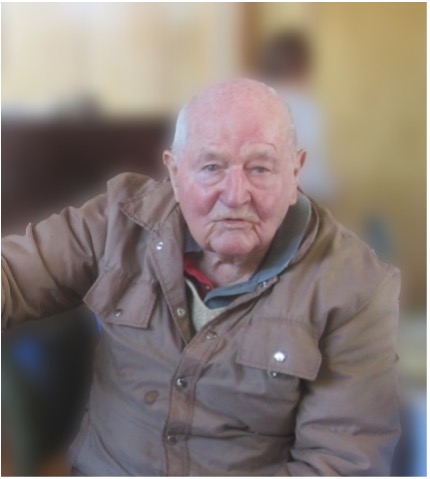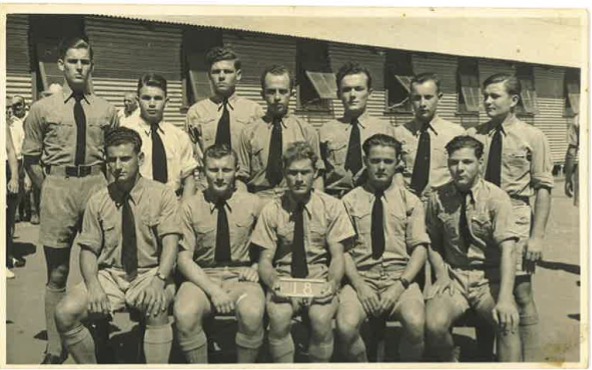Wilhelm SAWATZKY (b.1923) [P36056]

Wilhelm SAWATZKY
Wilhelm, known as Bill, Sawatzky was born in August 1923 in Wilhelma, one of the Temple Society’s agricultural settlements in Palestine (now Israel).
He is one of very few who can claim to have been interned in five camps during WWII – Camp 5 (Wilhelma, Palestine), Camp 3 (Tatura, Victoria), Camp 10 (Loveday, South Australia), Camp 14 (Loveday, South Australia), and Camp 1 (Tatura, Victoria).
Bill recently celebrated his 100th birthday in the Temple Society Australia’s (TSA) Bayswater Hall in Victoria with many family, friends, and community members present.
The Temple Society is a faith-based community with its roots going back to 19th century southern Germany.
Members migrated to the Holy Land and set up communities from 1868 onwards. They maintained their German language, culture, and nationality over successive generations of living in Palestine.
Bill was the youngest of four children. His father died a week before Bill’s birth. After completing basic schooling in Wilhelma, Bill became a farmer.
Following its 1918 conquest of the Middle East from the Ottoman Empire, Great Britain was accorded a 25-year League of Nations Mandate over Palestine in 1923.
At the outbreak of WWII, the Wilhelma settlement was turned into a perimeter camp, enclosed by barbed wire, and all German citizens of Wilhelma became civilian internees on September 3, 1939.
Families from other Templer settlements and individuals from various European countries were also interned in Wilhelma, now labelled Camp 5. At this time, Bill met Helga Eppinger, his wife-to-be, who had been moved to the Wilhelma camp from Jerusalem together with her family.
Bill and his mother, his sister Helene with her husband (Rudi Hoefer) and two young children were transported to Australia along with 536 Templers from Palestine (including Helga Eppinger and her family) in 1941, on the ocean liner Queen Elizabeth to spend six years of internment before being released again: Bill on April 15, 1947, and his mother on December 16, 1947.
At first, he was interned in the family camp, Camp 3, Tatura (later known as Camp 3, Rushworth) from 25 August 1941. On February 10, 1943, all single males over eighteen years of age, including married men who had been separated from their families in Palestine, were transferred to Camp 10, Loveday, a men’s camp near Barmera, South Australia. The first group sent there totalled 42 men, followed, in due course, by all young men from the Tatura family camp when they turned 18.
In Loveday, Camp 10, Bill shared hut No. 62 with 24 men, all of whom were Templers from Palestine.
He was interned there until he was transferred to Camp 14 (also in S.A.) on January 12, 1944. In these camps, Templer men met and worked with groups of German civilians taken prisoner in Persia (now Iran) and transported to Australia in November 1941. https://www.german-civilians-of-persia-wwii.com
The German internees, including those from Iran and Palestine were then moved to Victoria, to Tatura Camp No. 1, in several groups, Bill’s group on January 24, 1945.
During his time in Camp 1, he was the manager of the football team (soccer), made up of Templers and other Germans interned with them.
On September 4, 1946 he was transferred back to Camp 3, Rushworth, to rejoin his mother and sister and her family. He was able to resume contact with Helga Eppinger, who was also interned in Camp 3 and worked in the kitchens, as did Wilhelm after his return from the other camps.
He was finally released on April 15, 1947, three months after Helga Eppinger, who had been released on January 21. They married in 1951 and settled in Boronia, Victoria, where they raised their family.

Loveday Internment Camp 10, South Australia, 16 March 1943.
Photo TSA Archive
Theo Wagner (back left), Hanskarl Baldenhofer, Dieter Ruff, Gerd Beilharz, Rolf Weller, Hans Richter, Wilhelm Sawatzky.
Frieder Vollmer (front left), Otto Löbert, Hans Beck, Willi Reichert and Frieder Hermann.
Written by Doris Frank
Heritage & Culture Focus Group
Temple Society Australia